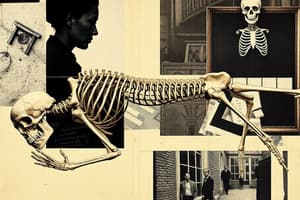Podcast
Questions and Answers
What are the roles of a forensic pathologist at a scene of death?
What are the roles of a forensic pathologist at a scene of death?
The roles of a forensic pathologist at a scene of death are to pronounce/confirm the death, determine the manner of death, determine the time of death, and obtain clues and information at the scene.
What are the possible manners of death that a forensic pathologist can determine?
What are the possible manners of death that a forensic pathologist can determine?
The possible manners of death that a forensic pathologist can determine are natural, accidental, homicidal, suicidal, or undetermined.
What are the post mortem changes that a forensic pathologist studies to determine the time of death?
What are the post mortem changes that a forensic pathologist studies to determine the time of death?
The post mortem changes that a forensic pathologist studies to determine the time of death are rigor mortis, hypostasis, cooling, decomposition, and insects which start a life cycle on the body.
What are the responsibilities of a forensic pathologist at a scene of death?
What are the responsibilities of a forensic pathologist at a scene of death?
What are the different manners of death that a forensic pathologist can determine?
What are the different manners of death that a forensic pathologist can determine?
What are the post mortem changes that a forensic pathologist studies to determine the time of death?
What are the post mortem changes that a forensic pathologist studies to determine the time of death?
Flashcards
Manner of Death
Manner of Death
A forensic pathologist determines if a death was natural, accidental, homicidal, suicidal, or undetermined.
Pronounce Death
Pronounce Death
A forensic pathologist establishes the cause of death at the scene, often by examining the body and its surroundings.
Rigor Mortis
Rigor Mortis
This refers to the body's stiffening after death, a process studied by forensic pathologists to estimate time of death.
Hypostasis
Hypostasis
Signup and view all the flashcards
Cooling (Algor Mortis)
Cooling (Algor Mortis)
Signup and view all the flashcards
Insect Activity
Insect Activity
Signup and view all the flashcards
Study Notes
Roles of a Forensic Pathologist at a Scene of Death
- Examines the body and surrounding environment to gather information about the circumstances of death
- Conducts a thorough external examination of the body to identify any signs of injury or trauma
- Collects and preserves physical evidence from the body and scene
- Takes photographs and videos of the body and scene
- Documents findings and observations
Manners of Death
- Homicide: death resulting from intentional harm by another person
- Suicide: death resulting from intentional harm by oneself
- Accidental: death resulting from unintentional injury or accident
- Natural: death resulting from disease or natural causes
- Undetermined: death where the cause or manner cannot be determined
Post-Mortem Changes
- Algor mortis: cooling of the body after death
- Livor mortis: discoloration of the skin due to blood pooling
- Rigor mortis: stiffness of the muscles after death
- Decomposition: breakdown of the body's tissues after death
- Entomological changes: study of insect activity on the body to determine time of death
- Autolysis: self-digestion of the body's tissues after death
Studying That Suits You
Use AI to generate personalized quizzes and flashcards to suit your learning preferences.




